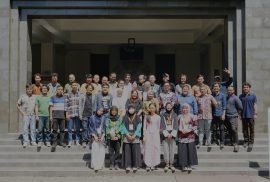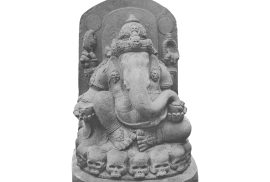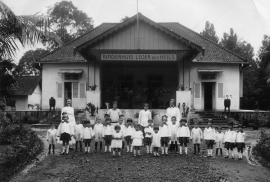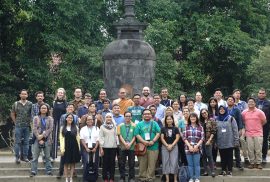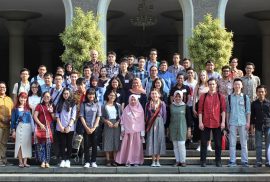Untuk kedua kalinya, Departemen Sejarah FIB UGM mengadakan kegiatan summer school bertema sejarah lingkungan, khususnya dalam bidang sejarah ekologi manusia. Bertempat di Fakultas Ilmu Budaya, summer school tersebut dilaksanakan sejak 15 hingga 20 Juli 2024 yang diikuti oleh 30 peserta dari berbagai kalangan. Kegiatan ini berjalan sukses melalui kolaborasi kolaborasi dari berbagai akademisi dalam maupun luar negeri hingga LSM lingkungan yang aktif melakukan advokasi lingkungan. Beberapa di antaranya yakni Dr. Abdul Wahid, Dr. Farabi Fakih, Prof. Gerry van Klinken, Prof. Nawiyanto, LSM Walhi, dan lain-lain.
summer school
Membangun Warisan Sadar Sejarah Berbasis Komunitas
Departemen Sejarah, Universitas Gadjah Mada
5-10 August 2024
Tentang Summer School
Pengembalian warisan-warisan benda dari Belanda ke Indonesia selama beberapa tahun terakhir ini telah menimbulkan pertanyaan besar di masyarakat mengenai makna daripada warisan benda dalam masyarakat. Sudah tidak dipungkiri lagi bahwa museum merupakan lembaga yang asing bagi masyarakat Indonesia dan bahwa museum hanya dikunjungi oleh anak-anak sekolah yang diwajibkan datang. Mengapa warisan benda dan lembaga yang menaunginya seperti museum sering dianggap asing dan jauh dari komunitas? Kritik dari pengkaji warisan budaya menengarai bahwa salah satu alasan utama akan jarak dan keterasingan warisan yang tersimpan dalam museum terletak pada sifat inheren museum sebagai lembaga kolonial. Museum dan produksi pengetahuan mengenai warisan yang muncul beriringan dengan kolonialisme dan pembentukkan ilmu-ilmu seperti arkeologi dan linguistik itu bebasis pada ontologi Barat yang oleh karena itu sebenarnya mengandung dan mereplikasi kekerasan-kekerasan epistemik daripada penjajahan Barat.
This workshop and summer school program examines the scope, spread and development of faith‐based child separation in colonial Indonesia (1890‐1980). It investigates policies and practices of institutional education of children separate from their parents, kin and community.
Tentang Summer School
Sebagai kelanjutan dari summer school tentang lingkungan yang telah diselenggarakan dengan sukses tahun lalu di Departemen Sejarah UGM, summer school tahun ini mengangkat tema tentang ekologi manusia dalam menghadapi tantangan penciptaan governance lingkungan baru untuk abad ke-21. Merujuk kembali pada kritik capitalocene terhadap permasalahan governance lingkungan yang dibentuk oleh kapitalisme pada abad ke-20 dan 21, summer school ini bertujuan untuk mengeksplorasi akan bentuk-bentuk ontologi pemerintahan lingkungan yang di luar dari ekstraktivisme kapitalis and modernisasi negara. Disini, kita akan menelusuri dan mengingat kembali cerita dan pengetahuan yang telah lama disimpan dalam memori kolektif kultural bangsa Indonesia – serta membayangkan bentuk-bentuk kebangsaan dan kewarganegaraan ekologis yang berakar dari tradisi dan pemahaman lokal.
__________
Course Title
Resilience and Control: Transmissible Disease and the Rise of Modern Society
__________
Course Description
The Covid19 epidemic has reminded all of us of how fragile the relationship between man and nature has always been. Modern society to a significant extent was based on the mythology of the control of nature by man-made science and the reduction of risk of the dangers lurking outside of human civilization. The latest Anthropocene-approach to understanding human and the natural world tend to emphasize human effect on nature. Human civilization became the determiner of a fragile and weak natural system ravaged by the activities of global man. While the discussion on Risk Society also focused on the dangers of civilizations and the running way of technology to the detriment of human society and civilization. The fear always comes from the dangers lurking from within human civilization. This idea of the scientific conquest of the natural world was a central myth of modern society. Yet, just a century ago, the idea of the natural order controlling human fate and civilization had reigned supreme. Capitalism and industrialization had by then expanded to towering heights, producing hellish landscapes of the Satanic mills or the tragedy of the bondage laborers of tropical plantations. Yet these landscapes were rarely seen as taking over nature. The industrialization of the 19th century and the greater human civilization was still seen to be eking its existence on the margins of the natural world.
Course Description
The Department of History, Universitas Gadjah Mada in Yogyakarta plan to continue holding its second year summer school on transnationalism in Southeast Asia following on the successful summer school on transnationalism held at the Faculty of Cultural Sciences, Universitas Gadjah Mada in 2018 with the title “Transnational History: Becoming a Cosmopolitan Historian.” The theme of the second summer school is a broadening of the application of transnationalism in looking not just at historical phenomenon, but present day economic, social, religious, cultural and political phenomenon in the city of Yogyakarta that is rooted in transnational forces and flows. By looking at how transnational flows create emergent potentialities that disrupt regulatory, moral and cultural spaces tethered on notions of fixed spaces and boundaries, the disruptive forces of transnationalism have resulted in categorizing certain people, things, practices and ideas as illegal, illicit, immoral and other pejorative notions; for instances illegal immigrants, drugs or ‘western-customs’. At the same time, other people, things, practices and ideas are considered as legal, legitimate and good. The movement of these groups from one society or country to another has resulted in placing these groups on either side of the legal, licit and moral framework resulting in contestations and reformulation of the framework themselves. These interplay between legal and illegal and moral and immoral thus represent a way in which societies ‘move forward’, by contesting the boundaries and framework of what are considered as good, bad or neutral.
We intend to look into these phenomena critically through theoretical, historical and social science discussion on various transnational manifestations in the city of Yogyakarta. These transnational phenomena appear in the form of social spaces, cultural events, economies and belief systems and represent the intertwining of transnational and local spaces and societies. These represented long historical phenomena from the period when Southeast Asia was part of that Asian trade network that brought over foreign culture, religion and social practices that would be entwined in the city’s identities. These same historical forces continue today and become engaged or re-engaged with present day flows; for instance, the rise of modern religion whether Islam, Christianity or Buddhism resulting in new flows such as pilgrimages to ‘new’ holy sites of the old Borobudur, or how ideas of the mysterious and transcendental East has created a tourist networks of ‘hippies’ on the hunt for spiritual enlightenment, or new practices that were brought over from Indonesian migrant workers and their discrimination at the hands of officials or the rise of Kpop or JPop and its relations with the racial notions of identities of Asian cool or new re-engagement with old forms of sexualities, religious beliefs and how these are met in today’s democratic Indonesia. These and others represent the field study in which students could engage, theorize and historicize such phenomenon in order to understand and appreciate them. These changes are often disruptive and result in dismay, discrimination, banning and, perhaps even, persecution. Understanding how some of these flows came to be regarded as normal while others persecuted is an important component of the critical education of the summer school.
__________
Learning Outcome
- To emphasize understanding about history and transnationalism in Southeast Asia
- To discuss contemporary issues related to transnationalism in Southeast Asia in culture, gender sexuality, economy and religion context.
- To emphasize understanding about transnationalism process network in Southeast Asia.
__________
Method and Output
The aim of the summer school is to provide the means for students in the field of history and social sciences to critically engage with transnational phenomenon by analyzing its manifestation in the city of Yogyakarta. By holding this exercise as a multicultural and multinational venture with students from around the Southeast Asia region and beyond, it allows students to distance themselves from their national narratives and regulatory, moral and cultural spaces. This distance allows them to open dialogue and re-examine their territorialized notions of legal and moral perspectives. The summer school is a cosmopolitan and denationalizing exercise; gathering students from around the world in order to facilitate a transnational dialogue. The dangers of placing people, things, practices and ideas within these legal and moral framework is apparent when one confronts its human victim; whether they be victims of state apparatus or criminals profiting from these transnational flows. At the same time, the creation of transnational spaces results in emergent identities, practices and ideas that are positive, uplifting and creative. This positive aspect of transnationalism also requires a critical perspective in understanding its relationship with the wider society and with the wider transnational flows. Students will be equipped with theoretical lectures on transnationalism and transnational history, but also engage in field studies into communities, organizations or activities in the city of Yogyakarta. The transnational approach allows such a local and semi-isolated place like Yogyakarta to be a rich node of global processes because its framework inherently decenter nodal connections. It also allows us to see in what way has Europe, Australia, Thailand, Vietnam, Malaysia, the Philippines and so forth are reflected in the history and phenomenon of Yogyakarta. such exercise will allow students to identity transnational connections with their own local histories, identities and practices.
__________
Time & Place
Date : July 22nd – August 2nd, 2019
Time : 08.30 am-15.00 pm
Course Venue : Faculty of Cultural Sciences, Universitas Gadjah Mada
Field Research : Communities in Yogyakarta
__________
Lecturer
- Prof. Dr. Atsushi Ota (Keio University, Japan)
- Prof. Dr. Bambang Purwanto (Faculty of Cultural Sciences, Universitas Gadjah Mada, Indonesia)
- Prof. Dr. Danny Wong Tze Ken (University of Malaya, Malaysia)
- Prof. Dr. Itty Abraham (National University of Singapore, Singapore)
- Prof. Dr. Jos Gommans (Leiden University, Netherlands)
- Prof. Dr. Kathrine McGregor (Melbourne University, Australia)
- Asst. Prof. Dr. Adisorn Muakpimai (Thammasat University, Thailand)
- Asst. Prof. Dr. Bhawan Ruangsilp (Chulalongkorn University, Thailand)
- Dr. Ariel C. Lopez (University of Philippine, Philippine)
- Dr. Erwan Agus Purwanto (Faculty of Social and Political Sciences, UGM)
- Dr. Farabi Fakih, M.Phil. (Faculty of Cultural Sciences, Universitas Gadjah Mada, Indonesia)
- Dr. Francis A. Gealogo (Ateneo de Manila University, Philippine)
- Dr. Laksmi A. Savitri, M.Si. (Faculty of Cultural Sciences, Universitas Gadjah Mada, Indonesia) –in confirmation-
- Dr. Pham Van Thuy (Vietnam National University, Vietnam)
- Dr. Phil. Shiskha Prabawaningtyas (Paramadina University, Indonesia)
- Dr. Sri Margana, M.Phil. (Faculty of Cultural Sciences, Universitas Gadjah Mada, Indonesia)
- Dr. Suzie Handajani, M.A. (Faculty of Cultural Sciences, Universitas Gadjah Mada, Indonesia)
- Dr. Yerry Wirawan (Sanata Dharma University, Indonesia)
- Dr. Yoseph Djakababa (Pelita Harapan University, Indonesia)
- Alia Swastika (ARK Galerie)
- Yulianti, PhD. Candidate (Faculty of Cultural Sciences, Universitas Gadjah Mada/ Leiden University)
__________
Application
The course is free but limited to 36 participants only and please read carefully important information below:
Organized by History Department, Faculty of Cultural Sciences and Faculty of Social and Political Sciences, Universitas Gadjah Mada
Transnational history has produced a significant body of work since its development in the late 1980s and early 1990s. This approach owed its inception as part from the shift from political history that was comfortably located within the national narrative toward social and cultural history in the 1970s and 1980s that developed perspectives such as race, ethnicity, class, and gender that was localized and non-national. These developments, unfortunately, had worried historians because of the parochial and antiquarian nature of local histories. The early 1990s and 2000s saw the publication of David Thelen’s Toward the Internationalization of American History and Thomas Bender’s Rethinking American History in Global Age from which efforts to provincialize and denationalize American history has pointed the way for a true dialogue of experts from all parts of the world in imagining differential spaces other than that of the nation-state. This is needed in order to construct an American historiography that could meet the current needs of a globalizing world and place it with emphasis on a perspective of the future. Instead of focusing on local phenomenon, the emphasis was on understanding social, cultural and political ones as a transnational process; reconceptualizing identities, communities, and products within different transnational framework; for instance, Hollywood movies as it was received and recreated on other parts of the globe and thus seeing it not merely as an American cultural product, but a wider globalizing phenomenon. Bruce Mazlish and Ralph Buultjen’s edited volume Conceptualizing Global History expands this further by bringing forth ideas in developing global narratives of local or non-national identities and spaces. Two approaches that were identified by Thelen has been to focus on either borderlands, as liminal spaces in which national units undergo transformative shifts, and the comparative approach, not merely as a means for national historians to compare each other’s narratives but to create new perspective altogether that is both national and international.
Prasenjit Duara points to the political nature of the act of transnational history. “For me, personally, this reevaluation is necessary to counter the growing trend of ultranationalists, intolerant groups in many parts of the world, such as Japan and India, who are seeking to rewrite textbooks and otherwise seize control of the vast machinery of historical pedagogy established over the past twentieth century.” This warning, published in a book edited by Thomas Bender in 2002, seems prescient today in 2018 when the growth of nativist and anti-globalist discourse has transformed the political landscape of many countries and pushed forth the rise of neo-fascist movements. This reevaluation mainly occurs by training historians themselves to have an internationalist outlook and be cosmopolitan. Cosmopolitan in the sense that their view of history should always place them both in a national and international perspective. As Bender points out “the true cosmopolitan must cultivate a doubleness that allows both commitment and distance, an awareness at once of the possible distance of the self and of the possibility of dialogical knowledge of the other.” Transnational history does not intend to disqualify national history, but to enrich its perspective by allowing other non-national perspectives to have a voice in what Duara has called the ‘machinery of historical pedagogy’ – an important tool in which ordinary people use to develop the boundaries of their identities. As Ernst Renan noted, the national narrative requires a degree of forgetting. This act of forgetting has always been violent with significant long-term implications.
Creating a sense of cosmopolitan distance requires moving one’s self, both spatially, but more importantly, socially and culturally, from one’s national zone. Distancing oneself from the national narrative and its ever-present gaze require meeting students from other identities with their own narratives and gazes. The Summer School to be held at Universitas Gadjah Mada is both a cosmopolitan and denationalizing exercise; gathering students from around the world in order to facilitate that transnational dialogue. The exercise is also meant to try and practice the transnational gaze, reconceptualizing identities in a local manner and identifying transnational relations; looking at the presence of their locality in the spaces and history of Yogyakarta. The students will be trained to identify local narratives and identities in the vicinity of the city of Yogyakarta but also identifying possible transnational connections to their countries or to a more global phenomenon. For instance, looking at the relationship between Yogya’s Buddhist communities and phenomenon with those of other communities in Southeast Asia, analyzing Asian popular culture and how it is received by people in the city in the form of cosplays, how has Western romantic idea of the East in the form of the hippy trail resulted in the rise of tourism and how hippy culture affected the local art scene in Yogya, how has Chinese cuisine affected local food items in comparison to other parts of the world, in what way has the global resurgence of political Islam since the 1970s affected the rise of alternative local Muslim outside of NU and Muhammadiyah and its comparison with the scene from other countries. By localizing these transnational nodes within the fabric of Yogyakarta’s urban space, it interrogates these spaces and push for the emergence of new, transnational narratives from them. The transnational approach allows such a local and semi-isolated place like Yogyakarta to be a rich node of global processes because its framework inherently decenter nodal connections. It also allows us to see in what way has Europe, Australia, Thailand, Vietnam, Malaysia, the Philippines and so forth are reflected in the history and identity of Yogyakarta. Such exercise will allow students to identify transnational connections within their own local and national histories.
Course Description
Gaining a cosmopolitan and transnational perspective on place and history allows a rethinking of identities and boundaries that creates a multicultural and multi-narrative reading of current and past realities. This ability is important in today’s world of increasing sectarian and nationalist polarization, producing important counter-narrative that is local, national as well as transnational in scope.
Learning Outcome

